Planet: the Welsh Internationalist magazine has been forging connections between Wales and the rest of Europe from 1970 onwards, through the work of writers such as Sartre, R.S. Thomas, Eugène Ionesco, Francesc Parcerisas, Jan Morris and very many others.
Just as it had a key role to play throughout the process of European integration, Planet is urgently needed as Wales goes through the tumult of Brexit, to strengthen Welsh internationalism and fight Wales’s corner as the nation faces ever greater challenges and inequalities.
In the last few years we have been responding in the most pro-active way to the challenges opened up by the Leave vote, addressing Wales’s lack of agency in the Brexit negotiations with constructive proposals for everything from agricultural and anti-poverty policy to associate EU status for Wales and how to fight Far Right xenophobia.
If you would like to take a stand for Welsh internationalism as Wales leaves the EU, and stay connected to both Wales and Europe, take out a subscription here: https://www.planetmagazine.org.uk/shop
“Time and again Planet has taken me upwards and outwards from the fulcrum of Wales to the furthest reaches of discussion and discovery.” Jan Morris
“Since its inception almost half a century ago, Planet has consistently pushed our boundaries of discourse. It has challenged, provoked and inspired. In a world where so many are hell-bent on building barriers and narrowing horizons, we need it now more than ever.” Mike Parker
“In a time of Brexit, when Wales’ political future is uncertain, Planet: The Welsh Internationalist could not be more needed. Placing Wales – its thinkers, artists, and social reformers – on a world stage, Planet makes connections between Wales and other countries, seeking to inspire, enrich, and develop projects at home. Ultimately, it is a vehicle for the legacy of Wales’ greatest thinkers and reformers from Raymond Williams to Aneurin Bevan.” Zoë Brigley Thompson
Here is a selection of articles on Wales and Europe we have published from 2016 onwards:
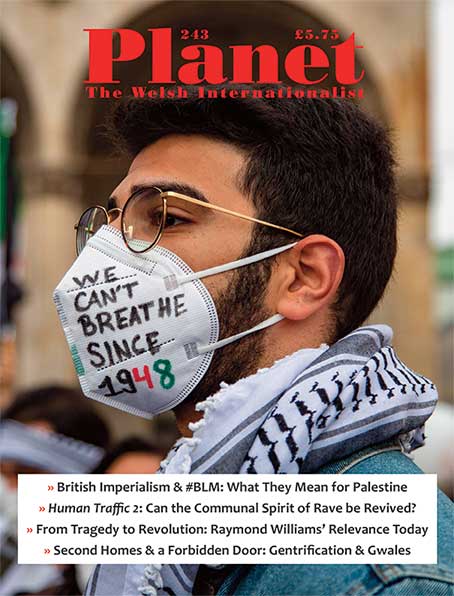
Planet 243
In analysing the Catalan situation in 2021, Ned Thomas gives an insight into the institutional complexity and behind-the-scenes politics that means there is no simple answer to the question of whether the EU is capable of enabling self-determination more broadly; but concludes on an optimistic note.
Read more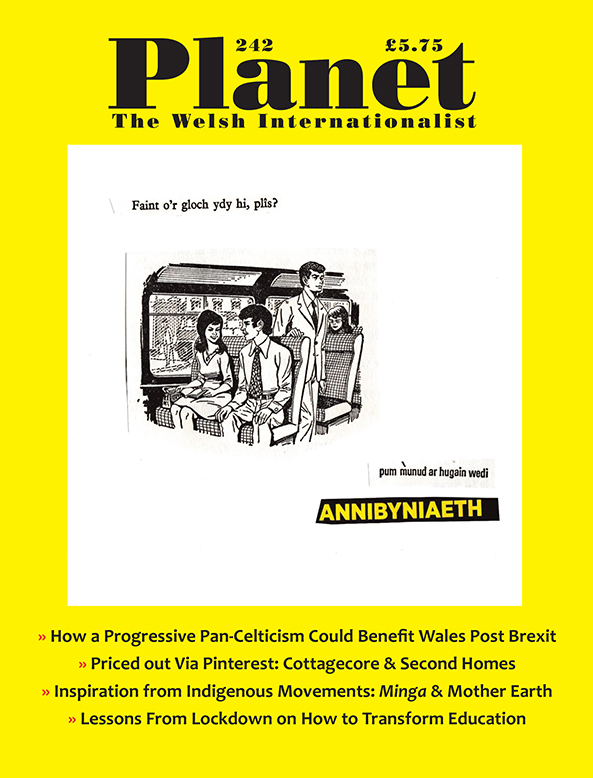
Planet 242
Anthropologist Jonathan Evershed describes how his life has been defined by Irish Sea crossings. He draws on the deep history of connections between Wales and Ireland to detail what’s at stake with post-Brexit border changes, and how a renewed, progressive Pan-Celticism could benefit both nations.
Read more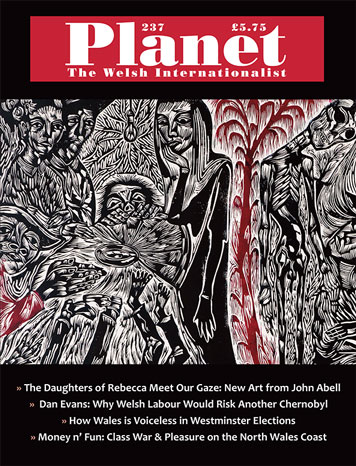
Planet 237
Film director Colin Thomas takes a trip back to Ireland, remembering how he resigned from the BBC over censorship of his Troubles coverage. He discovers that the country has lost none of its charm, but that in a Brexit era there is still no escape from British politics.
Read more
Planet 237
Steven Lovatt draws on Raymond Williams to describe England’s material, spiritual and ecological malaise, and how he and his Hungarian partner felt compelled to cross the border. Why does the Welsh independence movement feel more inclusive than the nationalism of his home country and Hungary?
Read more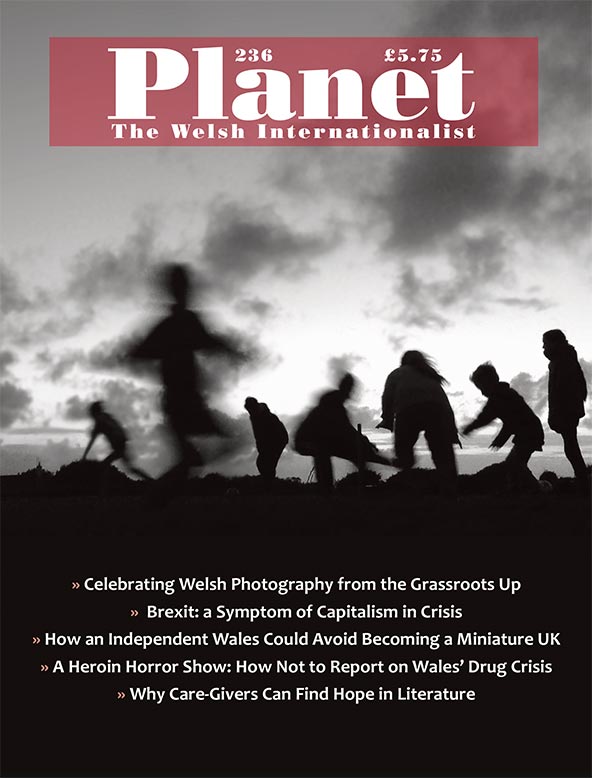
Planet 236
An editorial by Emily Trahair.
Read more
Planet 236
Huw Williams argues that whether or not we leave the EU, many of the underlying dilemmas for Wales are the same. He offers concrete proposals for how to strengthen a weak public sphere, bring reconciliation to a fractured nation, push for greater autonomy and contribute to the global struggle for an alternative to neoliberal politics.
Read more
Planet 236
A Poem by Neetha Kunaratnam.
Read more
Planet 236
In an article that exposes the roots of Brexit-era Germanophobia, Rita Singer details how Welsh press coverage and poetry about U-Boat attacks on Welsh ships evolved into racialised depictions of German U-Boat combatants as ‘Huns’, monsters, ghouls and Satanic fiends.
Read more
Planet Extra
Responding to the current Brexit stalemate and the looming prospect of No-Deal, in this free Planet Extra article, Daryl Leeworthy proposes how to strengthen the Remain campaign in Wales, and reflects on how this feeds in to creating a new, 21st-century social democracy, designed by Welsh Europeans.
Read more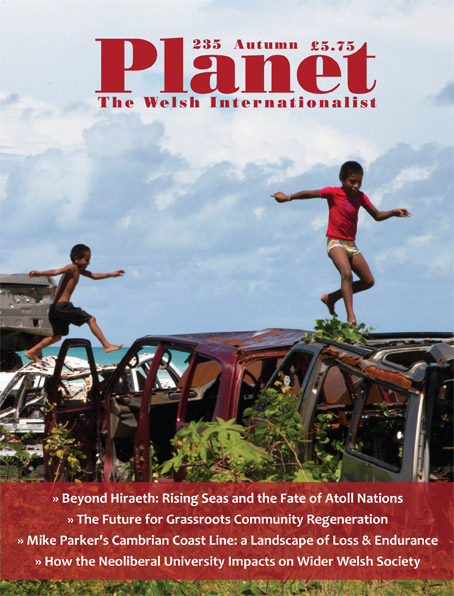
Planet issue 235
Garry Tregidga reflects on the centenary of the Levant mining disaster as a starting point for wider discussion of Cornwall’s fluctuating cultural, economic and political fortunes over the last century. What does the future hold after Brexit?
Read more
Planet issue 235
An editorial by Emily Trahair.
Read more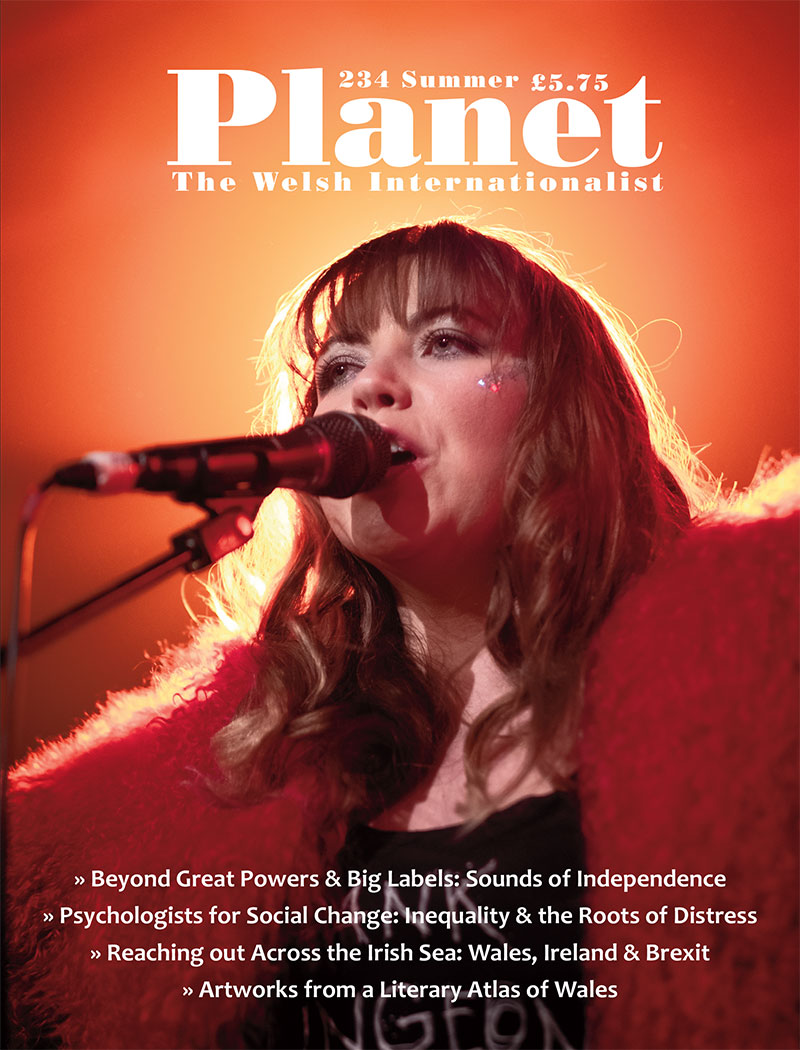
Planet issue 234
An editorial by Emily Trahair.
Read more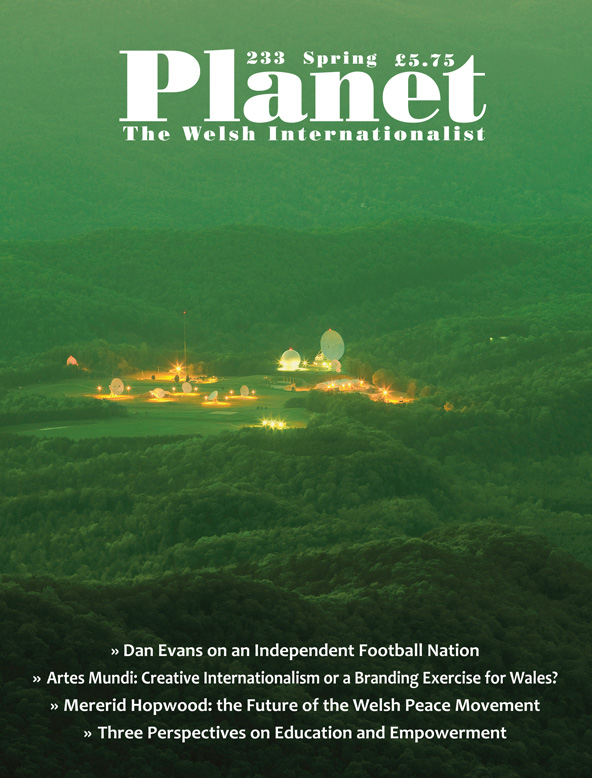
Planet issue 233
Hywel Dix argues why the popularity of the Nordic noir genre, and its Welsh noir offspring, has something significant to say about the lack of a collective, aspirational European identity; and Wales’ isolation from both continental Europe and the other nations of the UK.
Read more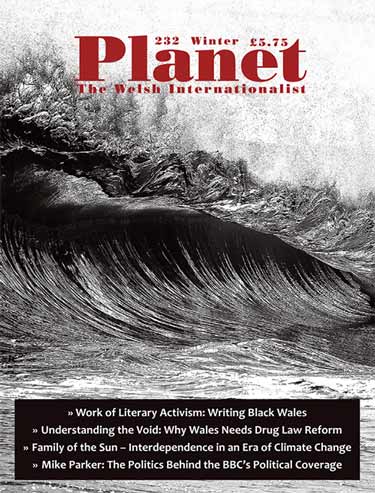
Planet issue 232
Mick Antoniw AM draws on his family background as part of the Ukrainian refugee community, and his experience on the EU’s Committee of the Regions, to detail how Wales could build on its historic relationship with Ukraine, from coalfield solidarity to language planning, and learn from other non-EU member nations further east how Wales could forge an alternative set of relationships with the EU after Brexit.
Read more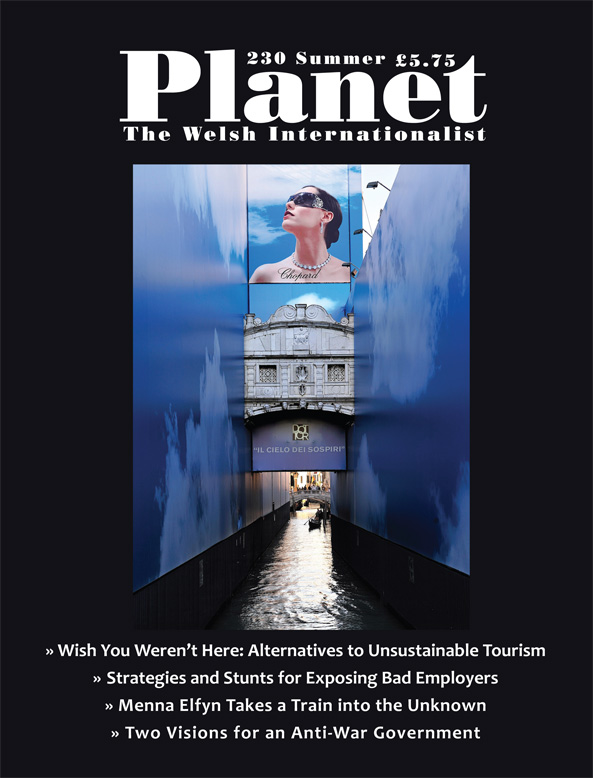
Planet issue 230
Alyce Von Rothkirch experienced the death of her mother at the same time as the aggressive fallout from the EU referendum led to her decision to leave her home in Swansea for her birthplace of Germany. She describes how this double loss followed a similar pattern…
Read more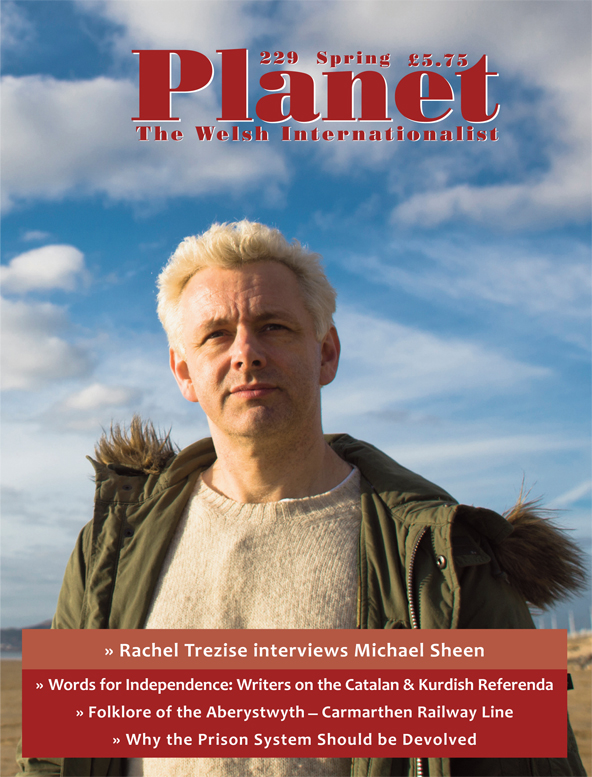
Planet issue 229
Eluned Gramich draws on her experience of accompanying her German father to his citizenship ceremony in Cardiff to reflect on the uncertain fate of EU nationals in the lead-up to Brexit, and also on the cultural and philosophical roots of citizenship itself. How do experiences of citizenship (and exile) differ around the world?
Read more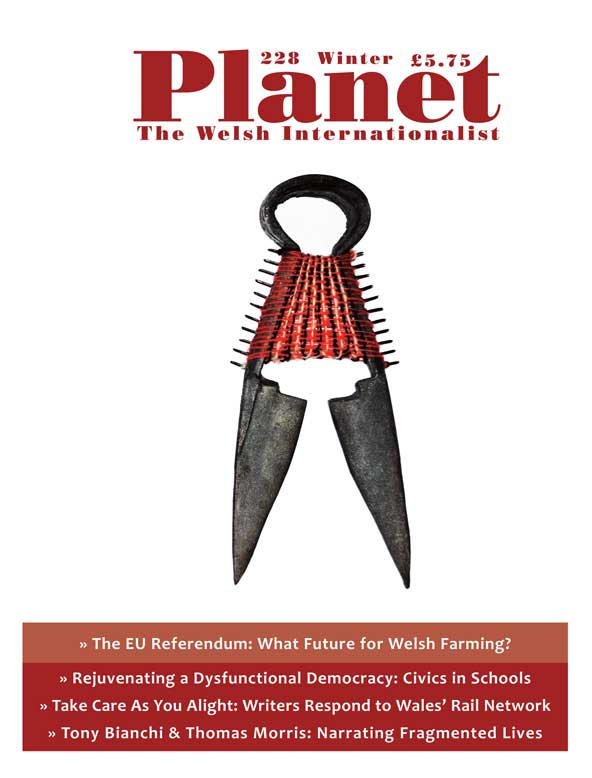
Planet issue 228
Following our invitation to pool ideas for how to safeguard Welsh national interests after the Leave vote, Ffion Jones draws on her experience as a sheep farmer and film-maker to offer proposals for the future, arguing that if farmers are not part of the dialogue for how to adapt agriculture policy post-referendum, this could decimate whole cultures and landscapes.
Read more
Planet issue 227
Following our invitation to pool ideas for how to safeguard Welsh national interests following the Leave vote, Ned Thomas warns that we first need to be fully aware of what is at stake for Wales should we no longer be part of a European mosaic of cultures and languages. With the dream of Welsh European ‘unity in diversity’ under threat, he argues that the Welsh language and Wales as a distinct political community face an uncertain future.
Read more
Planet issue 226
Following our invitation to pool ideas for how to strengthen Welsh national interests after the Leave vote, Dan Evans gives his perspective on what needs to be done to rejuvenate Wales’s public sphere, the weakness of which was revealed by the shock felt by many at the referendum result. He argues that for there to be meaningful dialogue which speaks truth to power, the dominance of Labour-affiliated intellectuals throughout society first needs to be addressed.
Read more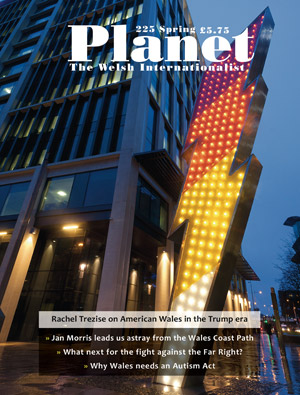
Planet issue 225
Why did Wales vote to leave the EU and Scotland vote to remain? Richard Marsden and Penni Bestic argue that to answer this question we need to examine how the Welsh and Scottish people perceive their turbulent national histories, and how this informs their sense of belonging.
Read more
Planet issue 225
Following our invitation to pool ideas for strengthening Welsh internationalism after the EU referendum, Meic Birtwistle offers personal snapshots from past struggles against the Far Right in proposing how to form alliances against rising racist attacks and support for UKIP in the wake of the Leave campaign.
Read more
Planet issue 224
Sioned Pearce and Stuart Fox offer a future direction for Welsh anti-poverty policy and cross-border collaboration on regeneration in anticipation of EU structural funds coming to an end.
Read more
Planet issue 223
Aled Gruffydd Jones interviews Syriza's Minister of Culture Aristide Baltas, who reveals how Greek citizens are reclaiming their ancient heritage in the name of radical democracy and internationalism, and offers inspiration for how other nations could expand cultural provision in the face of severe austerity.
Read more
Planet issue 223
Another Europe: An Atlantic Archipelago by Meic Llewellyn
Read more
Planet issue 222
The writer Tariq Ali interviewed by Ian Rappel. A pioneering figure in the international Left since the Vietnam War, Tariq Ali argues the case for radical independence for Wales in the struggle against austerity and war, and why the Left should vote to leave the EU.
Read more
Planet issue 221
Anne Lauppe-Dunbar is moved by an exhibition exploring the lives of Europeans who travelled or fled to Wales between 1750 and 2015, which brings to mind her mother’s flight from Germany, her own journey to Wales, and the current refugee crisis.
Read more
Planet issue 221
In the lead-up to the referendum, Jill Evans MEP details why EU membership is so crucial for Wales and offers a proposal for EU reform, arguing why a more democratic, progressive EU is vital in the face of economic inequality and the refugee crisis.
Read moreStay connected to both Wales and Europe: take out a subscription https://www.planetmagazine.org.uk/shop
